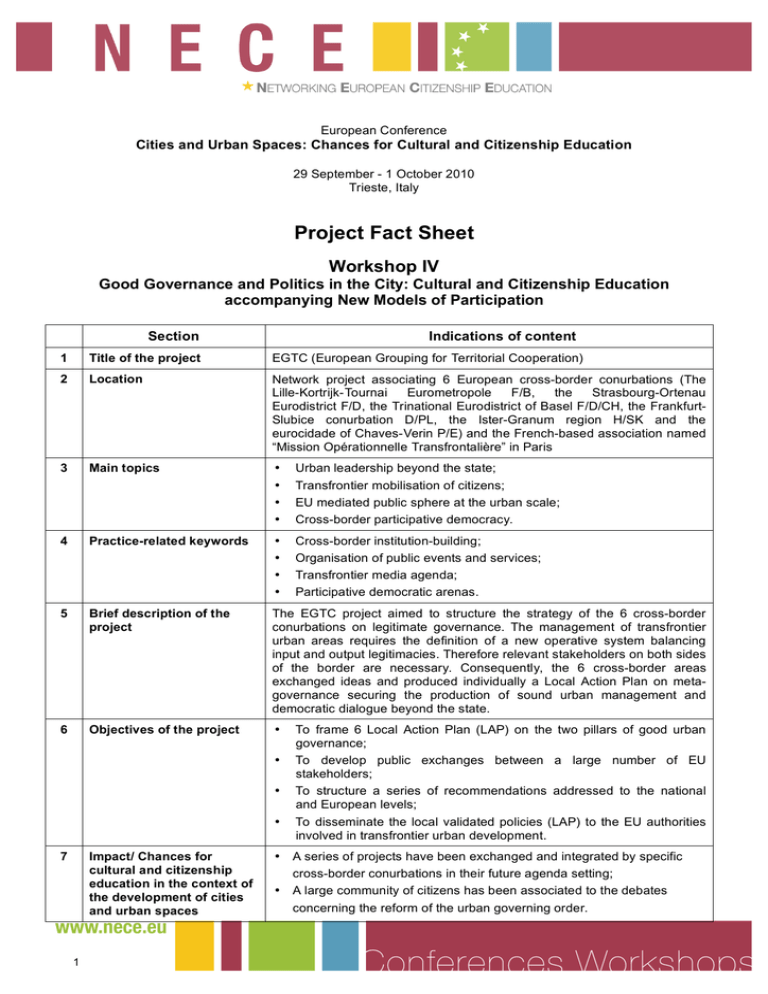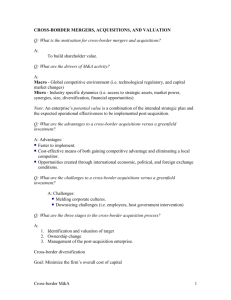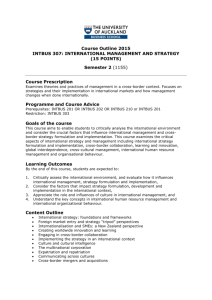Project Fact Sheet Workshop IV
advertisement

European Conference Cities and Urban Spaces: Chances for Cultural and Citizenship Education 29 September - 1 October 2010 Trieste, Italy Project Fact Sheet Workshop IV Good Governance and Politics in the City: Cultural and Citizenship Education accompanying New Models of Participation Section Indications of content 1 Title of the project EGTC (European Grouping for Territorial Cooperation) 2 Location Network project associating 6 European cross-border conurbations (The Lille-Kortrijk-Tournai Eurometropole F/B, the Strasbourg-Ortenau Eurodistrict F/D, the Trinational Eurodistrict of Basel F/D/CH, the FrankfurtSlubice conurbation D/PL, the Ister-Granum region H/SK and the eurocidade of Chaves-Verin P/E) and the French-based association named “Mission Opérationnelle Transfrontalière” in Paris 3 Main topics • • • • Urban leadership beyond the state; Transfrontier mobilisation of citizens; EU mediated public sphere at the urban scale; Cross-border participative democracy. 4 Practice-related keywords • • • • Cross-border institution-building; Organisation of public events and services; Transfrontier media agenda; Participative democratic arenas. 5 Brief description of the project The EGTC project aimed to structure the strategy of the 6 cross-border conurbations on legitimate governance. The management of transfrontier urban areas requires the definition of a new operative system balancing input and output legitimacies. Therefore relevant stakeholders on both sides of the border are necessary. Consequently, the 6 cross-border areas exchanged ideas and produced individually a Local Action Plan on metagovernance securing the production of sound urban management and democratic dialogue beyond the state. 6 Objectives of the project • • • • 7 Impact/ Chances for cultural and citizenship education in the context of the development of cities and urban spaces 1 To frame 6 Local Action Plan (LAP) on the two pillars of good urban governance; To develop public exchanges between a large number of EU stakeholders; To structure a series of recommendations addressed to the national and European levels; To disseminate the local validated policies (LAP) to the EU authorities involved in transfrontier urban development. • A series of projects have been exchanged and integrated by specific cross-border conurbations in their future agenda setting; • A large community of citizens has been associated to the debates concerning the reform of the urban governing order. 8 Target groups Urban political leaders located on both sides of the border; community stakeholders; private businesses 9 Project methods/ project format • Two parallel working groups: LSG (Local Support Group) and ESG (European Support Group); • The two issues discussed were urban leadership design and community involvement beyond the state; • Local communities were involved into the process. 10 Project planning schedule 5 stages of project planning: 1. Stage: October–December 2009 2. Stage: January-March 2010 3. Stage: April-June 2010 4. Stage: August 2010-February 2011 5. Stage: March 2011 11 Project initiator Mission Opérationnelle Transfrontalière is an associative structure having for objective to facilitate the realization of cross-border projects. 12 Resources involved The project was sponsored by the European URBACT programme. 13 Evaluation of the project/ materials/ presentation format The Local Action Plans and the European Action Plan were finalised. The communication agenda of the project was respected. 14 Range and sustainability of the project The project had a European range; To boost legitimate urban governance beyond the state in a series of 6 cross-border areas; To disseminate the policies to actors involved in other transfrontier conurbations and to European organisations 15 Project results • 4 European public conferences attracting approximately 100 public and private stakeholders; • 6 Local Action Plans to frame a new strategy on legitimate urban governance at a transfrontier scale; • 1 European Action Plan to facilitate a legitimate urban governance ate a transfrontier scale. 16 Project funding Total budget : 307 000 € EU funding (URBACT program): 212 000 € National co-financing: 95 000 € 17 Space for your own comments The Trieste region is a border area and it is one of the key symbolic European places where debates on urban citizenship and community involvement beyond the state can have its full meaning. 18 Contact information CEPS/INSTEAD Christian Lamour Website: www.ceps.lu Email: christian.lamour@ceps.lu Mission Opérationnelle Transfrontalière (MOT) Ludivine Salambo Website: www.espaces-transfrontaliers.org Email: ludvinie.salambo@mot.asso.fr 2

